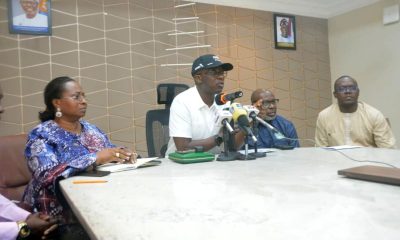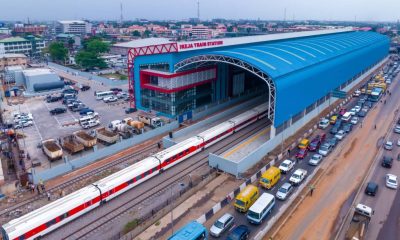News
Special status: Lagos seeks one percent Consolidated Revenue Fund allocation
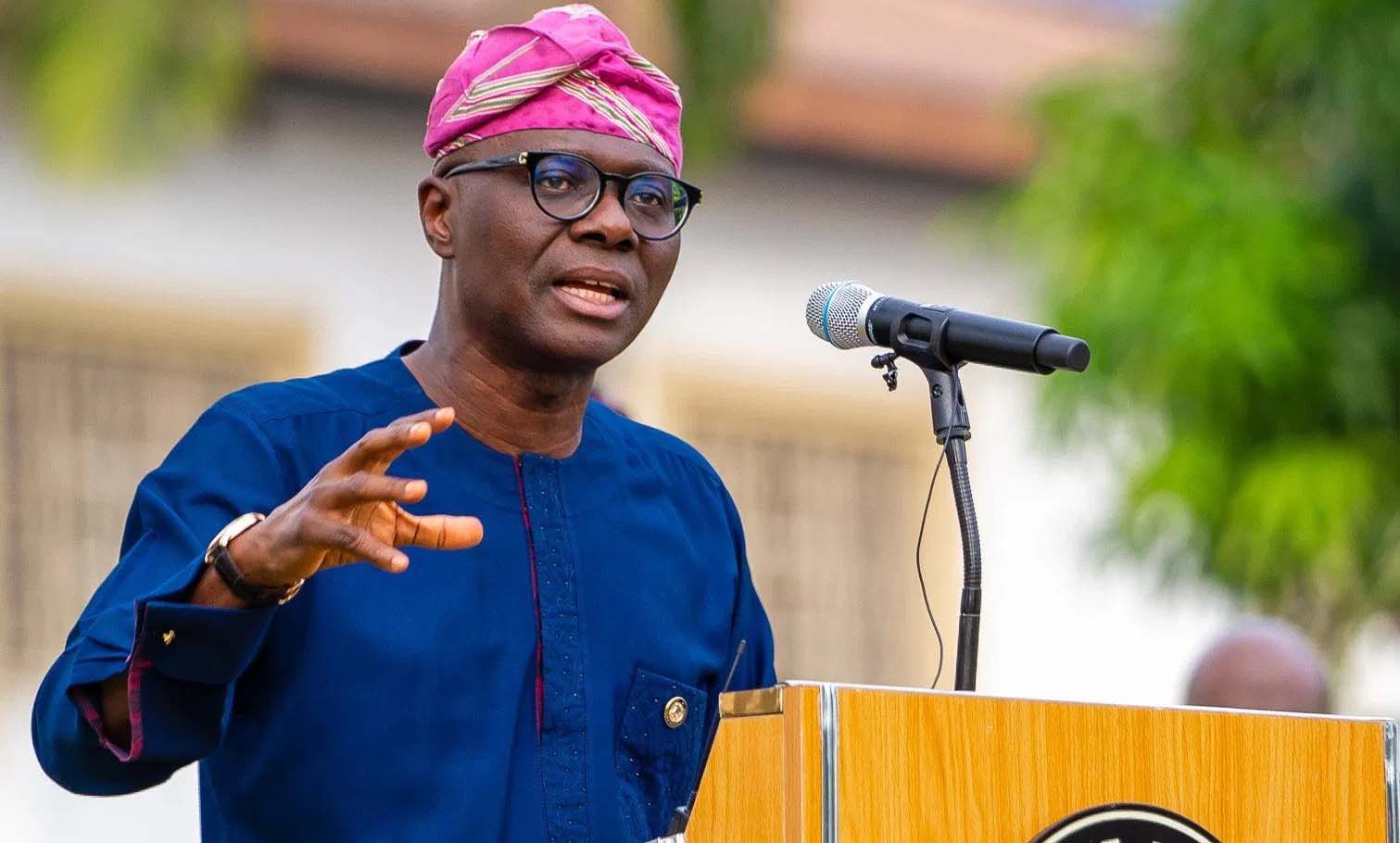
Should Lagos State’s demand for special status, being Nigeria’s business hub, sailed through, it will get one per cent allocation from the federation account.
Justifying its special status demand, Governor Babajide Sanwo-Olu said the state has multiplying effects on the Southwest region and the country.
The governor made the request at the opening of a two-day Southwest zonal public hearing on the review of revenue allocation formula organised by the Revenue Mobilisation Allocation and Fiscal Commission (RMAFC) at Lagos Continental Hotel, Victoria Island.
According to Sanwo-Olu, the revenue sharing formula should be 34 per cent for Federal Government, including one perc ent for Federal Capital Territory (FCT); 42 per cent for states; 23 per cent for local government areas and one per cent for Lagos State (Special Status).
He said the proposal should replace the prevailing revenue allocation formula of 52.68 per cent (Federal Government), 26.72 per cent (36 state governments) and 20.60 per cent (774 local government areas).
In a memorandum on the Review of Revenue Allocation Formula he submitted to the RMAFC, Sanwo-Olu declared that “allocating one per cent (Special Status) for the state and allowing the three tiers of government to share 99 per cent in a new revenue sharing formula is very straightforward, self-justifying and in no way controversial”.
The governor argued the review of the revenue allocation formula was long overdue, stating the best way to guarantee national progress and development is by paying attention to sub-national development because the national is a summation and a reflection of the sub-national.
Besides, Sanwo-Olu said the call for special status was recognition of its huge financial commitments to infrastructure and provision of basic amenities for the increasing population of its residents, as well as its preeminent contribution to the national coffers.
He said the call, which has been re-echoed at different fora and at various levels and tiers of government, cannot be over emphasised, especially against the backdrop of the current economic situation of the country, the aftermath of the last year’s #EndSARS protests and the devastating effects of the COVID-19 pandemic, for which Lagos has been the national epicenter.
He said: “Our demand is a sharing formula that is just, fair and equitable; reflecting the contribution of stakeholders to the common purse; and also one that enhances the capacity of state and local governments to deliver high-quality services and the full dividends of democracy to the greatest number of our people.
“Lagos State is no doubt the nation’s commercial capital, and population center. The level of funding required to service the State’s social and public infrastructure is so significant that it will be difficult for the State to bear the burden for much longer under the present arrangement.
“I should say that it will actually be unfair to expect the state to bear this heavy burden on its own. It is therefore necessary to give due consideration to all the variables that support our advocacy for a special status.
“The call for a special status for Lagos is not a selfish proposition; it is in the best interest of the country and all Nigerians, for Lagos which accounts for about 20 per cent of the national GDP and about 10 per cent of the nation’s population to continue to prosper.
“Lagos is more than just another state in the Nigerian federation. There is no tribe in the country that has no significant stake in Lagos State.
”As the former capital of the country for 77 years (compared to the 30 years that Abuja has been the Federal Capital Territory), Nigeria’s largest metropolis still bears the heavy brunt of being home to all Nigerians; irrespective of age, class, gender, religious affiliation or tribe.
“There are several statistics that shows the number of people that comes into Lagos every day, however, there are clear indications that most of these people migrate with the intention to make Lagos their new home and in pursuit of personal dreams due to the opportunities the city-state seemingly possesses, and this portends additional responsibilities on the government.
“Additionally, Lagos still harbors a huge number of federal establishments which could not be moved to Abuja.
“These include military cantonments and barracks, police, customs, immigration, civil defence, prisons, road safety and security/intelligence establishments.
“There are several reasons to justify the call for a special status for Lagos apart from the aforementioned factors, and by extension, a review of the revenue allocation sharing formula.”
Governor Sanwo-Olu also said that it would be unfair to leave the state to bear the burden of the massive destruction it experienced by the State during the #EndSARS protests hijacked by hoodlums and the COVID-19 pandemic without assistance from the centre.
“This month marks one year after the massive destruction experienced by the State in the violence that accompanied the hijacking of the EndSARS protests. Public buildings were burnt down, and historical infrastructure destroyed.
“Although we have put that experience behind us and forged ahead, the reality of this unfortunate incident remains with us; resources that should be committed to other areas of need are now being used for the restoration of these public facilities. It will be totally unfair for Lagos State to be left alone to bear these huge expenses without assistance from the centre.
“COVID-19 pandemic is another issue that has once again, supported the justification for Lagos to be accorded the privilege of a special status. As much as this affects the entire country, it is a fact that the degree of havoc caused by this virus differs from state to state.
“Lagos was the epicentre for this virus, the same way it was for the Ebola virus some years ago. The management of these unforeseen occurrences comes with huge responsibilities and financial commitments on the part of the state government.”
The governor commended the Chairman and members of RMAFC for taking a bold step, which he believed will “result in a fundamental alteration of the current revenue sharing formula, in favour of one that is truly fair and equitable, and that takes into full consideration the specific and more pragmatic fiscal contexts of the sub-national governments of the federation.”
RMAFC chairman Elias Mbam said a review of revenue allocation formula was necessary for fairness, equity, justice.
He said that the commission had started the process of reviewing the subsisting vertical revenue allocation formula in line with changing realities.
Mbia said: “The last review of the revenue allocation formula was in 1992. Since then, a lot of socio-economic changes have occurred, hence, necessitated the need for a review to reflect changing realities.
“RMAFC by virtue of paragraph 32(b) ,part 1 of the third schedule to the 1999 constitution of the Federal Republic of Nigeria (as amended) is empowered ‘ to review from time to time the revenue allocation formula and principles in operation.
“This is to ensure conformity with changing realities, provided that any revenue formula which had been accepted by an Act of the National Assembly shall remain in force for a period of not less than five years from the date of commencement of the Act.”
He said the commission had called for memoranda from stakeholders, including Civil Society Organisations (CSO’s), academia and the general public.
The RMAFC boss lauded Sanwo-Olu for accepting to host the hearing and commended the governors of Ogun , Osun , Oyo, Ondo and Ekiti for their active participation.
The Nation
News
Currency in circulation now N4.8tn – CBN report
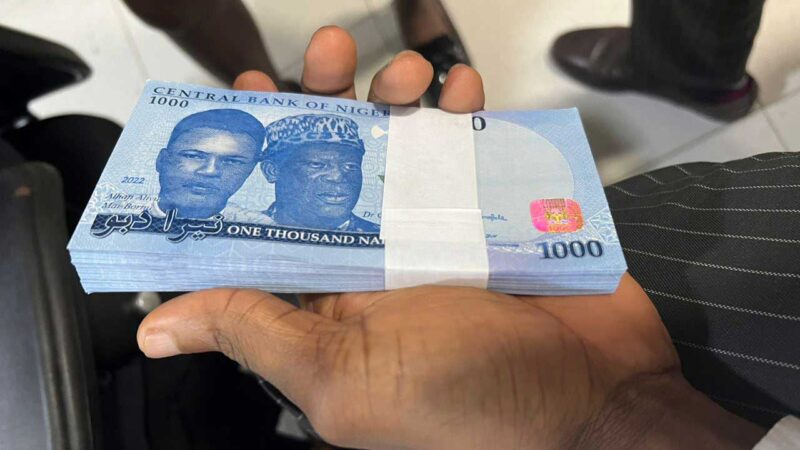
Currency in circulation now N4.8tn – CBN report
Currency in circulation has reached an all-time high of N4.8 trillion as of November 2024, recording over seven per cent increase from the previous month.
Also, currency outside banks grew significantly in the same month hitting an all-time high of N4.6 trillion from the N4.2 trillion in the month of October.
These figures were contained in the money and credit supply data from the Central Bank of Nigeria (CBN).
The currency in circulation is the amount of cash–in the form of paper notes or coins–within a country that is physically used to conduct transactions between consumers and businesses.
It represents the money that has been issued by the country’s monetary authority, minus cash that has been removed from the system.
Similarly, currency outside a bank refers to cash held by individuals, businesses and other entities that is not stored in banks.
The currency outside the bank represents about 96 per cent of the currency in circulation.
Nigerians have in recent times been facing acute cash shortage with banks limiting daily withdrawal at Automated Teller Machines (ATMs) to N20,000 irrespective of the number of accounts held by an account owner.
READ ALSO:
- Cross River man kills mother, dumps body inside well
- El-Rufai mocks Reno Omokri with throwback protest photos against Tinubu
- Warri refinery: Marketers hopeful of further petrol price drop
According to the latest data, the currency in circulation grew by seven per cent to reach 4,878,125.22 from 4,549,217.51 in October.
Currency in circulation has grown steadily in the outgoing year 2024 with over one trillion naira added to cash in circulation after starting the year with N3.65 trillion in January.
In February, the currency in circulation slightly increased to N3.69 trillion representing an increase of N43 billion or 1.18 per cent from the January figure.
March also saw an appreciable increase to N3.87 trillion while it further increased to N3.92 trillion in the following month of April.
The growth trajectory continued in May with the currency in circulation increasing slightly to N3.97 trillion, an increase of N42 billion or 1.07 per cent while it reached an all-time high of 4.04 trillion, an increase of 2.11 per cent from May.
The July figure also rose marginally with the currency in circulation settling for N4.05 trillion before growing to N4.14 trillion in August and N4.43 trillion in September and N4.5 trillion in October.
In the same vein, currency outside banks grew from N4.2 trillion in October to N4.6 trillion in November, showing increasing preference for other means of storing outside bank deposits.
Economist, Dr. Paul Alaje attributed the development to the expanding money supply, adding, “Money supply is expanding but this may not necessarily be in cash. As it is expanding, it will necessarily induce inflation. But you can’t blame the people. People must look for money. How much was bottled water last year, how much is it today? All of this will induce inflation. If you now ask, what is the cause of inflation? Is it money supply itself or a devaluation policy? It is a devaluation policy. Money supply is an offshoot. So the Central Bank is raising interest rates to actually reduce money supply but the more they try the more money supply expands.”
He stated that the floatation policy of the CBN has created inflation, adding, “It is like chasing one’s tail and I don’t know if you are going to catch it.”
Currency in circulation now N4.8tn – CBN report
News
Tinubu not telling Nigerians the truth, says Sule Lamido

Tinubu not telling Nigerians the truth, says Sule Lamido
President Bola Tinubu has been accused of not being forthright about the true state of Nigeria under his administration.
Former Jigawa State Governor and senior Peoples Democratic Party (PDP) member, Sule Lamido, made the accusation while speaking on the BBC Hausa programme Gane Mini Hanya.
Lamido criticized both Tinubu and former President Muhammadu Buhari for what he described as a lack of transparency in governance.
“Buhari’s and Tinubu’s governments are not being transparent with Nigerians unlike during the time when PDP was in power where everything was transparent and open to all Nigerians,” Lamido said.
READ ALSO:
- Odili: Fubara prevented Wike from turning Rivers to private estate
- Putin apologises over Azerbaijan plane crash reportedly shot down
- 256 terrorists, two logistics suppliers arrested in one week – DHQ
He accused the two administrations of relying on propaganda rather than providing citizens with accurate information.
Lamido also expressed concerns over President Tinubu’s recent loan requests, questioning the logic behind them. “If Nigerians are being told the truth then there is nothing wrong with that, but how would you budget N30tn, generate N50tn and then request loan when you have a surplus of N20tn,” he said, referencing last year’s budget.
He described the situation as “reckless” and “selfish,” adding, “This recklessness and clear-cut selfishness is not done anywhere in the world, but yet you find (some) Nigerians supporting it. Visit social media and see how APC is being criticised, being referred to as calamity, yet you find some protecting it.”
Tinubu not telling Nigerians the truth, says Sule Lamido
News
Nigeria Customs Service begins 2025 recruitment [How to apply]

Nigeria Customs Service begins 2025 recruitment [How to apply]
The Nigeria Customs Service (NCS) has announced the commencement of its recruitment exercise, assuring Nigerians that the process is entirely free and fair.
The agency has cautioned the public to be vigilant against scammers who may attempt to exploit unsuspecting applicants during the recruitment period.
Applications are invited for positions in the Superintendent, Inspector, and Customs Assistant cadres as part of the Service’s plan to recruit 3,927 officers in 2025.
This initiative is aimed at enhancing trade facilitation and supporting Nigeria’s economic recovery efforts.
“Our recruitment is entirely free and fair. At no stage do we charge fees. Anyone requesting payment is a scammer,” the agency emphasized, urging applicants to be wary of fraudulent schemes.
READ ALSO:
- Dangote, Tinubu, Lookman, Badenoch named among 100 most influential Africans in 2024
- Heavy security in Ilesa as ex-Osun deputy gov emerges new Owa-Obokun
- Hacker has stolen N180m from my NGO account – VeryDarkMan cries out
The NCS outlined eligibility criteria, stating that applicants must be Nigerian citizens by birth, possess a valid National Identification Number (NIN), and have no criminal record or ongoing investigations.
Academic qualifications for the three cadres are as follows:
Superintendent Cadre: A university degree or Higher National Diploma (HND) along with an NYSC discharge or exemption certificate.
Inspectorate Cadre: A National Diploma (ND) or Nigeria Certificate in Education (NCE) from an accredited institution.
Customs Assistant Cadre: At least an O’Level certificate (WAEC or NECO).
In addition to these qualifications, the NCS stressed that all applicants must be physically and mentally fit, providing evidence of medical fitness from a recognized government hospital.
Nigeria Customs Service begins 2025 recruitment [How to apply]
-

 Sports3 days ago
Sports3 days agoAnthony Joshua prostrates before Governor Abiodun during Ogun visit
-

 metro2 days ago
metro2 days agoWanted terrorist commander, Bello Turji, a dead man walking – DHQ
-

 metro2 days ago
metro2 days agoNigeria on life support when Tinubu took office – Akpabio
-
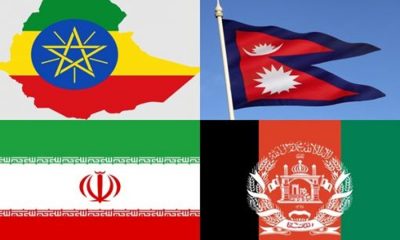
 metro2 days ago
metro2 days agoFour countries that won’t celebrate New Year
-
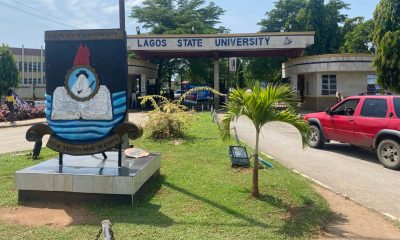
 metro3 days ago
metro3 days agoLASU don accuses Ikeja Electric of extortion, petitions FCCPC
-
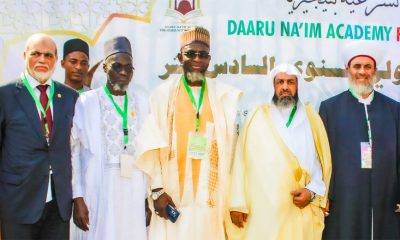
 metro11 hours ago
metro11 hours ago‘Deepen Shariah knowledge to curb misinformation’
-

 metro3 days ago
metro3 days agoN180m not missing from my account, it was all a plan – Verydarkman
-
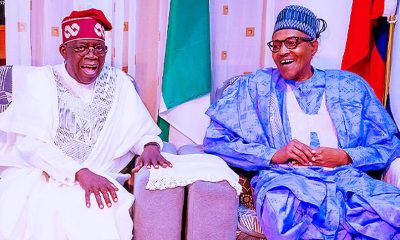
 metro3 days ago
metro3 days agoTinubu reveals Buhari’s role in commencement of Warri refinery operation







